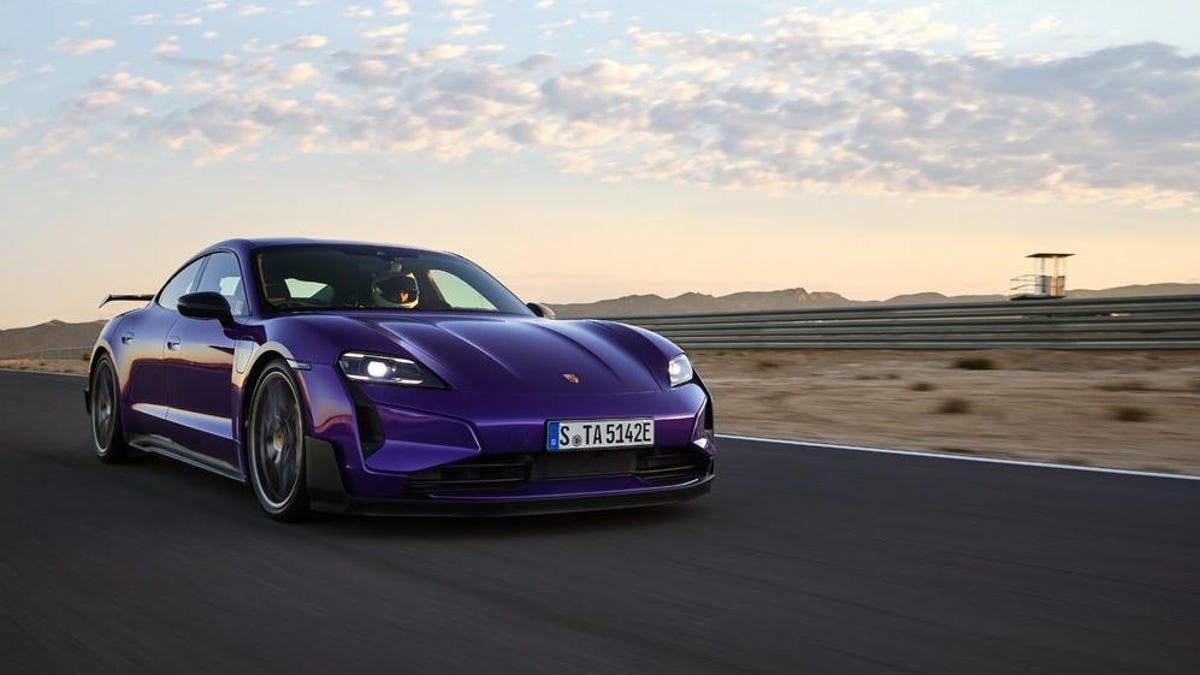Over the course of two seconds the planet we live on moves about 37 miles through space, the universe expands by about 100 square miles, five million emails are sent, and Porsche’s Taycan Turbo GT can go from zero to sixty miles per hour. In Car And Driver’s comprehensive instrumented test of the new German hyper electric sports sedan, it became the quickest car ever tested in the magazine’s nice 69 year history. The Turbo GT is quicker than a Lucid Sapphire, quicker than a Tesla Plaid, and quicker than the magazine’s previous acceleration champion, Ferrari’s SF90.
Crucially, this acceleration run was tested using a model not equipped with Porsche’s weight-saving Weissach Package option, so its possible the car could go even quicker. A Taycan Turbo GT with the Weissach option loses its rear seat and gains a rear wing and a bunch of carbon fiber to drop 165 pounds. Using C/D’s one-foot rollout system, to simulate a standard drag strip timing light, Porsche once held the acceleration record with the 918 Spyder’s 2.1-second run, which was matched by the Sapphire and Plaid EVs. Ferrari grabbed the lead by a tick with a two-seconds flat run.
Moreover, the Porsche’s quick run is reliable and repeatable. Writes C/D’s Dave Vanderwerp:
This record-setting performance was not just squeaking by, either, for example, a 1.949-second run that happens to round down to 1.9. Our results are always an average of the quickest runs in each direction to take out any effect from wind or several other factors, and the Taycan’s two passes were 1.898 seconds in one direction and 1.910 in the other. Bam.
For decades the measure of a supercar was its ability to gather enough speed to break the two hundred miles per hour barrier. Porsche was fighting for that title in the 1980s with its 959 supercar as well, though it topped out at just 197 mph. As more and more cars soon crossed the 200 mph threshold, top speed became almost irrelevant to all but the most well-heeled customers. While there are still a few cars vying for outright fastest, it’s mostly been forgotten about since the Bugatti Veyron beat the McLaren F1’s once-thought-unbeatable number.
Acceleration is quickly becoming the same race. It’s a battle of diminishing returns, and it’s debatable whether consumers even really care about a car accelerating that quickly. When the average economy car was running 12-second 0-60 times in the 1990s it was impressive to have a sports car capable of doing it in five seconds. These days a Toyota Rav4 plug-in hybrid can put down those kinds of numbers, and regular Tesla Model 3 are running in the low threes. And that’s before you start talking about how a 1.9-second 0-60 run makes you feel.
It’s a seriously impressive figure for Porsche, regardless of how impractical it is. I guess getting a car to launch is one of those things you learn when you spend 70 years building race cars.

